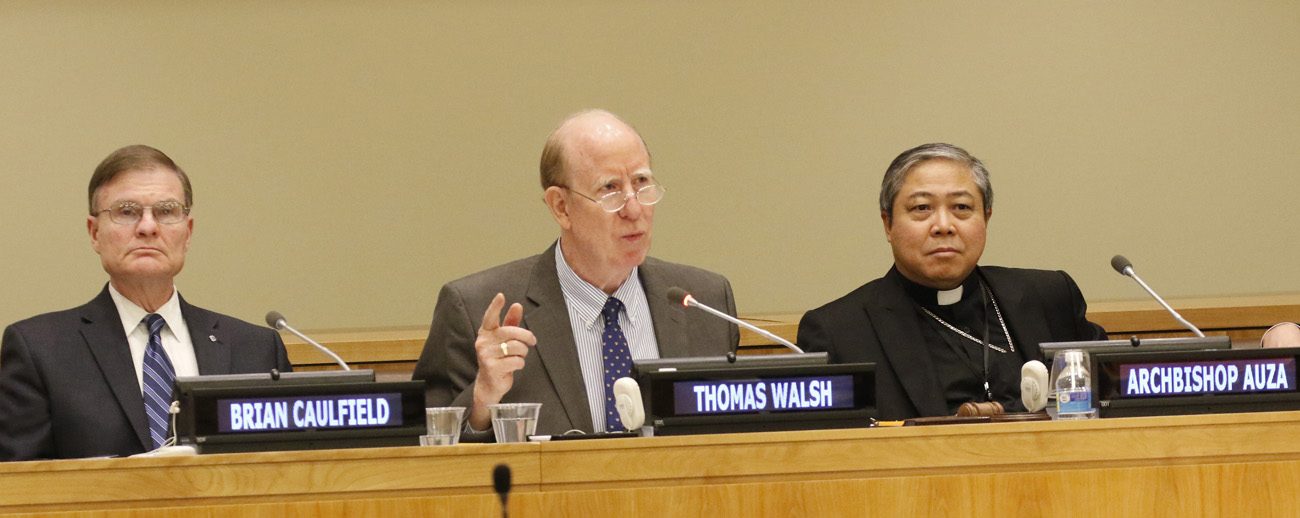UNITED NATIONS (CNS) — The future of humanity depends on parents’ commitment to protect and nurture their children, instill values and help children mature as human beings, speakers told a United Nations event to mark the fourth annual Global Day of Parents.
Despite a global retreat from parenthood and marriage, most children are being raised in stable two-parent families that are associated with good emotional, physical, social and economic outcomes, several speakers said during the June 1 event.
“The Importance of Fatherhood and Motherhood for Integral Development” was co-sponsored by the Holy See Mission to the U.N. and the Universal Peace Federation.
[hotblock]
“The importance of moms and dads, and of their joint commitment in raising the next generation, cannot be overstated,” said Archbishop Bernardito Auza, the Vatican’s permanent observer to the U.N.
“The future of humanity depends on how well moms and dads do in their mission as teachers in forming their children in values, socialization, trust, mutual respect and responsibility, education, hard work, affection, compassion, forgiveness, solidarity, and ethical development,” he said.
Pope Francis, in his exhortation “Amoris Laetitia” (“The Joy of Love”) following a two-year-long synod process focused on families, holds motherhood and father in the highest esteem, and underscores the value of their harmonious cooperation for the good of their children, the archbishop explained. “Their combined service is greater than the sum of their individual work, and their children profit most from their complementary teamwork,” he said.
Paraphrasing Pope Francis, Archbishop Auza said, “Moms and dads as co-educators either instill in their children trust and loving respect by their affection, example and trustworthiness, or by their failure to provide in this way, leave their children questioning whether their parents are sincerely concerned about them.”
Thomas Walsh is president of the Universal Peace Federation, which has adopted as its motto “the family is a school of love.” He said the family has underutilized potential for social development on small scales. Parenthood should be woven into a compelling narrative to give voice to social assets, he said.
Furthermore, two-parent families, compared with single parents, “often have more time, money, attention, kinship support and stability to give to their children,” said Brad Wilcox, director of the National Marriage Project at the University of Virginia. Likewise, family instability creates stress, disrupts social networks and leaves less time for caregiving, he said.
Presentations also focused on motherhood, children not experiencing the advantage of a father in their lives, and the security children gain by seeing a healthy, loving relationship between their parents.
[hotblock2]
Brian Caulfield, director of the Fathers for Good, an initiative of the Knights of Columbus, said there is little public discussion about the high number of U.S. children being raised without a father. “There’s a general feeling that fathers are expendable,” promoted by media stereotypes of “the doofus Dad,” he said. “Having imbibed the brand, many men have retreated from making their mark.”
Pediatrician Meg Meeker said children gain security from the relationship between their parents and strong character development comes from diverse exposure to mother, father and faith.
With children spending as much as eight hours a day on media and in front of video screens, compared to 34 minutes with their parents, Meeker said it is crucial for parents to be engaged and available so they can protect their offspring and set them on a path toward responsibility and maturity.
Picking up on that theme, Deborah McNamara, a clinical counselor at the Neufeld Institute in Vancouver, British Columbia, said 21st-century parents are digital immigrants who must lead their children into a new age. Longing for attachment is the greatest human hunger, she explained, and children can satisfy it through a strong caring relationship with an adult, rather than virtual connectivity to their peers.
“Relationship is the most important thing the family offers. It protects our children in adversity. We need to protect the relationship at all costs,” McNamara said.
“We need to believe we are what our children need. We are our children’s best bet. We have to be the buffer to the world outside,” she added.
“We cannot send our children into a digital age empty-handed with only their technology in tow. Parents are still the best devices.” she said.
PREVIOUS: Extreme faith: God makes big demands, gives infinite love, bishop says
NEXT: Pope to appoint advisory board in removing negligent bishops




As I look back I am so thankful for my parents regarding church attendance. Mom was the prime mover as she regularly attended mass which encouraged my sister and I to attend. On the other hand, Dad was not a church goer but he believed. He encouraged our attendance and often made sure we went.
With God, all things are surely possible.